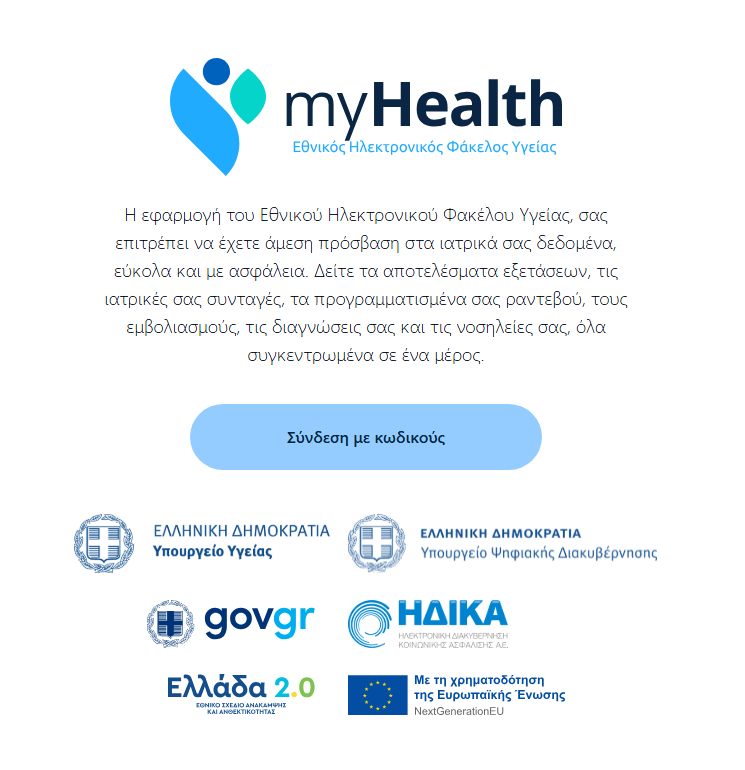Greece’s nationwide rollout of the new digital platform for the National Health System, known as MyHealth, was officially initiated on Monday, May 26, 2025. The platform has been designed to support the National Electronic Health Record (EHFY), and it is now being made available to everyone across the country. Through this system, medical data belonging to individuals is being securely integrated into a single, user-friendly digital environment.
You are now able to access your health records by visiting https://citizen.ehealthrecord.gov.gr. Within this platform, all relevant health information—including diagnoses, prescriptions, laboratory results, and hospital stays—is being gathered and presented in one centralized location. Similarly, healthcare providers are being granted access to patient histories through https://doctor.ehealthrecord.gov.gr, allowing for more informed and personalized medical care to be delivered.
What Are The Benefits — A wide range of advantages is being offered through the new platform. Full access to one’s medical history is being provided, with all health-related data stored in a secure digital format. Convenience is being enhanced, as users can now retrieve their health information from any location and at any time, using either the MyHealth mobile application or the official website. You are being empowered to take a more active role in managing your health, with improved tools for decision-making and communication with healthcare providers. Additionally, digital assistants powered by Artificial Intelligence are being made available to support users in understanding and managing their health more effectively.
Benefits for Healthcare Professionals — Doctors and other medical professionals are also being supported through this new initiative. A complete and instant overview of each patient’s medical history—including diagnoses, medications, surgeries, and hospitalizations—is being made available in one place. Clinical practice is being improved by reducing the time needed to gather information, thereby allowing more focus on patient care. Collaboration among healthcare providers is being strengthened through secure and efficient data sharing. AI-powered digital assistants are being introduced to help manage the system and extract relevant information. Unified access to medical data from all public and private healthcare providers is being facilitated, ensuring that doctors can make well-informed decisions regardless of where the patient has received care.

Statement by the Greek Minister of Health, Adonis Georgiadis — According to the Greek Minister of Health, Adonis Georgiadis, the launch of the National Electronic Health Record marks a historic milestone in the digital transformation of Greece’s public health system. The project has been implemented with consistency and foresight by the Ministry of Health, in collaboration with the Hellenic Institute of Public Health and the Ministry of Digital Governance. The way medical information is transferred and utilized is being fundamentally changed, with immediate and secure access to critical data now being ensured for healthcare professionals. Citizens are being given control over their care, while the government is gaining a clearer and more functional understanding of the nation’s health landscape. The overarching goal is to usher in a new digital era for healthcare in Greece—one that is transparent, accessible, and centered around the needs of the people.
Statement by the Minister of Digital Governance, Dimitris Papastergiou — Minister Dimitris Papastergiou emphasized that the National Electronic Health Record represents a major advancement in the healthcare sector. Citizens and doctors alike are being supported through this reform, which allows health information to be accessed simply and easily, from any location and at any time, via the MyHealth App. Bureaucracy is being reduced, as the need to carry physical documents and test results is being eliminated. Doctors are being equipped with complete patient histories, enabling them to provide more personalized and effective care. Artificial Intelligence is being utilized to offer tailored support through digital assistants, which respond to both citizens and healthcare professionals. Through collaboration with the Ministry of Health and the organization IDIKA, a series of digital projects is being advanced to improve healthcare and simplify daily life for both citizens and health officials.
Looking Ahead — The universal implementation of the National Electronic Health Record is being recognized as a transformative moment for Greece’s healthcare system. By embracing digital technology and prioritizing user-friendly design, the government is making healthcare more accessible, efficient, and personalized. Citizens and doctors alike are being empowered to take full advantage of this new era in health management.
This initiative is being seen as a significant step toward a smarter, more responsive health system in Greece. By centralizing and digitizing health records, the government is aiming to improve the quality, efficiency, and accessibility of healthcare services. The integration of AI tools is being used to enhance user experience and streamline administrative processes. Citizens are being encouraged to engage more actively with their health data, while doctors are being supported in delivering better care through improved access to information.
Special attention is being paid to the security and privacy of medical data. All information is being stored in compliance with strict data protection regulations, and access is being controlled through secure authentication methods. Citizens can feel confident that their health records are being handled with care and confidentiality, while healthcare providers are being given the tools they need to maintain professional standards.
As the platform continues to evolve, additional features and services are expected to be introduced. The Ministries involved are committed to ongoing improvement and innovation in the digital health space. Feedback from users will be taken into account to ensure that the system remains responsive to the needs of both citizens and healthcare professionals.

















